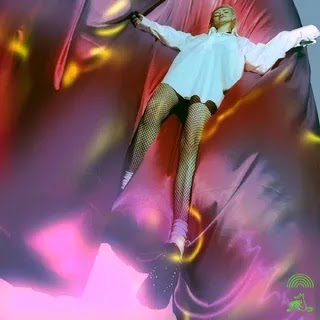Bright, noisy, and 10 years in the making, the long-awaited second album from the internet’s original viral pop star leaves little impression beyond smooth-brained confusion.
In early 2006, 18-year-old Anna-Catherine Hartley arrived with her debut single as Uffie, the boastful, baby-voiced novelty rap “Pop the Glock.” MySpace virality led to bonafide underground stardom: Uffie signed to trendy French electro label Ed Banger, and another song, “Robot Œuf,” was included in the soundtrack for a Pedro Almodóvar film. But as her fame inched closer to the mainstream, Uffie disappeared from view. Her debut album, Sex Dreams and Denim Jeans, arrived in 2010—three years behind schedule—with a guest appearance from Pharrell. In February 2012 she announced that she was working on a second album, but just over a year later, she declared her retirement.
Sunshine Factory, Uffie’s long-awaited second album—10 years delayed, to be exact—marks a self-appointed departure. “I’m really getting frustrated with being associated with bloghouse,” Uffie told NYLON (which identified her as “a bloghouse-era icon”). “I know that’s where I started and I know I took a break, but I am putting out substantial work with dope people.” Produced mainly by chillwave heavyweight Toro y Moi, Sunshine Factory steps away from the self-effacing sleaze of Sex Dreams into a purgatorial nightclub haze. Uffie explains it, rather vaguely, as a nightclub-themed fantasy of post-pandemic “escape”: an “alternate reality” in which “all the misfits can gather.” The album’s barrage of incongruous alt-rock guitars and convulsive electroclash synths is dizzying enough to open up a wormhole, but in all its bright, noisy, unfocused glory, Sunshine Factory is undeniably a good time.
Throughout the album, indie rock and shoegaze influences butt heads with electro-house beats and avant-LMFAO lyricism. It works often enough: Though opener “mvp” never builds to the satisfying intensity of its Strokes-esque bassline, its pulsing rhythm is undeniably catchy. At other points, it falters; the shoegaze-y crunch of “prickling skin” falls apart once Uffie’s fuzzed-out vocals enter the picture. Her aughts-core, reverb-heavy sing-raps feel anachronistically out of place, particularly when the instrumentals lean toward ’80s and ’90s indie rock. It’s when Uffie breaks away from these self-imposed genre constraints that her music really takes on new life: The frenzied drums and breakneck babbling of standout “dominoes” imbue the song’s ’00s teen-movie guitar licks and fizzy hi-hats with an unexpected hyperpop sparkle. Peaches’ introductory voicemail embraces the hilarity of being the messiest one at the function: “Hey Uffie…I’m not gonna make it to the party. I got my dick stuck in the door and I can’t get it out! Ughhh.”
Uffie’s lyricism, however, remains scattered at best. Moments of surprisingly blunt lucidity (“I’m not against it/I just don’t want to remember it” on lead single “Cool”) are quickly lost in the pages of her pop culture Rolodex, from which she spits reference after reference as if from a cash cannon. Madonna, Obama, and the Jetsons are but three of her inscrutable shoutouts; “Sophia” seems to nod to Yaeji (“Make it rain girl get it soon”) and SOPHIE (“Shake it up and make a smoothie”) as it simultaneously wipes the dust off the Migos’ “bad and boujee.” Clichés about Bonnie and Clyde, or the urge to “get away” when “things been too crazy,” feel strangely self-serious on an album whose opening line is “We cum at the same time.”
This wavering between don’t-give-a-fuck honesty and debatably intentional genericism makes the album difficult to process. Song to song, Uffie can’t seem to fully commit to a tone or even to pastiche. Album closer “crowdsurfinginyoursheets” zags from tender piano ballad to echoing vocals with all the charm of a Spotify advertisement, before finally veering into a forgettable “lo-fi hip-hop beats” track. Sunshine Factory’s biggest weakness might be its sense of under-commitment to any concept at all—the very thing that once made Uffie stand out. “Pop the Glock” was garish, but Uffie’s first and most lasting impression was that of an artist committed to the bit and unconcerned with the reception. As maximal as Sunshine Factory is, it ultimately feels dilute, leaving little impression beyond smooth-brained confusion.



0 comments:
Post a Comment